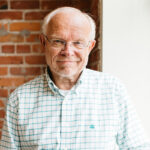Though this reflection speaks directly to men, David’s story offers insight for all of us who wrestle with forgiveness, calling, failure, and grace.
A Call to Men
David was called a man after God’s own heart. That wasn’t a title; it was a name whispered by God—a way of saying, ‘I know this man, flaws and all, and I still choose him.’ David’s identity was forged not in the noise of battle but in the quiet hours under the stars, where only sheep and sky kept him company. Out there, he came to know God as a companion, friend, and coach. He learned to trust that “my times are in your hands.”
But let’s be honest—David’s story isn’t clean. It’s not the story of a perfect man. It’s the story of a man who failed big and still got back up. He lusted for another man’s wife and took what wasn’t his. He plotted a murder to cover his sin. He failed his own son Absalom. His heart broke in more ways than one. Yet in the middle of that mess, he wrote psalms so honest they still break through our defenses today. He was torn, tangled, and deeply human. And still, David sang. Still, he sought. Still, he believed that God’s mercy was greater than his failure.
Men—this is the message we need to hear again. Your failure doesn’t disqualify you. It invites you.
Richard Foster once wrote that David’s solitude became “a portable sanctuary of the heart.” [1]Even surrounded by noise, David carried silence within him—a stillness that shaped his soul. From that inner place, three practices became his comeback rhythm:
Gratitude
David saw God’s mercy in the mundane. Even in guilt, he noticed grace. He trained his eyes to see God at work, even when his own hands were stained.
“I will give thanks to the Lord with my whole heart.” (Psalm 9:1)
“At night, His song is with me.” (Psalm 42:8)
Courage in the Two Worlds
He lived between the valley of the shadow of death and the table of hospitality. He knew battle and banquet, loss and love, the ache of mortality and the promise of everlasting life. He could say, “Some trust in chariots and some in horses, but we trust in the name of the Lord our God.” (Psalm 20:7)He knew what it meant to fall hard—and rise again.
Honest Confession
This was David’s true strength. He confessed his sin, fully and without spin. He didn’t hide. He didn’t blame. He named it, sang it, and wept it. And through his tears came freedom. That’s where God met him—not in his perfection, but in his confession. Forgiveness flowed like oil. Healing began in truth.
Get Back in the Game
Men, it’s time to stop sitting on the sidelines. Perhaps it’s time to stop believing your failure means you’re finished. David’s story says otherwise. God is still setting tables in the valley. He’s still pouring cups that overflow. He’s still calling walking contradictions—like you and me—to get back in the game.
Can you hold both—the brokenness that leads toward death and the overflowing grace that leads toward life? Can you be grateful again? Can you be honest—with God, with a mentor, with a friend?
Practice
If you resonate with David’s story, take some time this week to write out your own—just one page. Tell the truth about moments of failure and grace, of valley and banquet. Where have you fallen, and where have you found mercy? Let your words hold both failure and gratitude in the same breath.
Men, consider reading it aloud to another man who knows how to listen with grace. That’s often where healing begins—when our stories are spoken and received. It’s how we begin to find our way back to the field.
[1] Richard Foster, Celebration of Discipline: The Path to Spiritual Growth, p. 104.
_______________________

Keith Anderson, D.Min., is a Faculty Associate for Spirituality and Vocation at VantagePoint3 and President Emeritus of Seattle School of Theology and Psychology. He is the author of several books, including his most recent: On Holy Ground: Your Story of Identity, Belonging and Sacred Purpose (Wipf & Stock, 2024). His other works include Reading Your Life’s Story (IVP, 2016), A Spirituality of Listening (IVP, 2016), and Spiritual Mentoring (IVP, 1999). In his writing, teaching, and mentoring, Keith seeks to set a table for people looking to enter the “amazing inner sanctuary of the soul” in the most ordinary and extraordinary moments of life.

